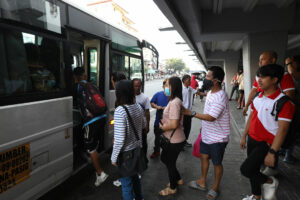PUV co-op loan freeze not affecting DBP credit growth
A DECISION by the Development Bank of the Philippines (DBP) to suspend lending to some public utility vehicle (PUV) cooperatives is not expected to substantially affect loan growth this year, it said. “The DBP’s portfolio is diversified, so we’re not just concentrated on the PUVMP (PUV modernization program). There are other industries that we cater […]

A DECISION by the Development Bank of the Philippines (DBP) to suspend lending to some public utility vehicle (PUV) cooperatives is not expected to substantially affect loan growth this year, it said.
“The DBP’s portfolio is diversified, so we’re not just concentrated on the PUVMP (PUV modernization program). There are other industries that we cater to,” Rustico Noli D. Cruz, who heads the DBP’s Program Assistance to Support Alternative Driving Approaches (PASADA) Financing Program, said via telephone.
“So, whatever the gap, if ever, in the target for 2024, we can easily get it from other sectors,” he said.
The state-run bank focuses on supporting infrastructure and logistics, including power, water, transport, logistics, tourism, as well as environment-related projects such as, namely solid and hazardous waste, sanitation, and energy efficiency.
It also lends to social services organizations like schools, hospitals, housing, local government units. It also supports micro, small and medium enterprises.
The DBP has been extending financial support to transport cooperatives to comply with the government’s PUV modernization initiative.
The PASADA Financing Program supports transport corporations and cooperatives to help them in their modernization transition.
The loans can partially finance the purchase of brand new PUVs that comply with government standards, alternative transport technologies, and the acquisition and/or construction of support facilities and equipment necessary for the proper operations and maintenance of the PUVs.
In August, DBP President and Chief Executive Officer Michael O. de Jesus told senators that the bank has stopped lending to PUV cooperatives, particularly in Metro Manila and areas without an approved route plan, due to debt repayment issues.
The DBP continues to lend to cooperatives with approved route plans, Mr. Cruz said.
“We sustained nonperforming loans, so… we really have to scrutinize further the viability of the various routes. One way is to look into, first, those with the approved route plan,” he said.
Under the Local Public Transport Route Plan, the maximum route distance for highly urbanized cities, independent component cities, and component cities is 15 kilometers (km).
Inter-regional, inter-provincial, provincial, and municipal routes have a maximum length of 35 km.
“We’re doing some sensitivity analysis, which will be the subject of our discussions with the DoTr (Department of Transportation), so they can consider the business aspect of the PUJ (public utility jeepney) operation,” Mr. Cruz said.
At the end of June, the DBP had approved P8.7 billion of the P10 billion in funding earmarked for the PUV modernization program.
The DBP’s net loans and receivables declined in the first half by 2.6% to P471.38 billion. — Beatriz Marie D. Cruz













